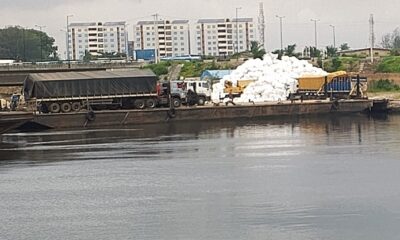Maritime
SEREC Demands Immediate Implementation of CTN

BY GBOGBOWA GBOWA
Leading industry research and advocacy group, the Sea Empowerment and Research Center (SEREC) has appealed to the federal government through the Ministry of Marine and Blue Economy to expedite action on the implementation of the Cargo Tracking Note (CTN), statutorily placed under the supervision and control of the Nigerian Shippers’ Council (NSC).
SEREC Head of Research, Sea Empowerment and Research Center, Fwdr Eugene Nweke Rff in a position paper made available to our reporter said while it whole heartedly supports the re-introduced CTN, expressed displeasure over delay in commencing its implementation, noting that the CTN regime will rejuvenate the nation’s port value system and enhance security of international trade.
Titled “AN INDUSTRY CLARION CALL FOR THE IMMEDIATE COMMENCEMENT AND IMPLEMENTATION OF THE CARGO TRACKING NOTE – CTN REGIME IN THE NIGERIA”, the paper given in subheads reads:
INTRODUCTION
After a broader analysis on the relevance for the reintroduction of the Cargo Tracking Note – CTN in our international trade security and port value adding system, the Sea Empowerment and Research Center – SEREC hereby strongly supports and lend a voice for the immediate commencement and implementation of the Cargo Tracking Note – CTN regime in our international trade security and port value adding system.
The SEREC noted from its findings that, the port industry trends, tilts towards the evolving of the CTNs in cargo processing operations to incorporate new technologies and innovations, such as:
a).Electronic CTNs – Electronic CTNs are becoming increasingly popular, as they provide a more efficient and secure way to track and manage cargo.
b).Blockchain-based CTNs – Blockchain-based CTNs are being developed to provide a more secure and transparent way to track and manage cargo.
c). API-based CTNs – API-based CTNs are being developed to provide a more integrated and automated way to track and manage cargo.
Presently, through the Nigeria Shippers Council, the Nigerian government, has approved the deployment of electronic cargo tracking notes for port operations, which is a significant step forward. Expectedly, the intention is to reduce delays in cargo shipment and cut costs for importers, by making the process more efficient and transparent, which is a win-win for everyone involved.
Additionally, the reintroduction of electronic cargo tracking notes is also seen as a way to curb insecurity and improve trade facilitation. By providing an accurate and reliable system in place, ports can better track and manage cargo, reducing the risk of theft, loss, or damage. This, in turn, can help to increase trust and confidence in the trade process, making it more attractive to businesses and investors.
Unfortunately, the implementation of this approved modest industry trade security and facilitation tools seems to be delayed for reasons not communicated to the industry stakeholders.
To buttress our support for this modest industry clarion call for the immediate commencement and implementation of the Cargo Tracking Note – CTN regime in our international trading space.
RELEVANCE OF CTN IN THE INTERNATIONAL TRADE AND PORT VALUE SYSTEM
The trends in the port system and its efficiency is all about using electronic systems to streamline the process, reduce paperwork, and increase efficiency, hence, the CTN beckons.
The SEREC, while acknowledging that, the move towards the implementation of cargo tracking notes may not be new, rather what is new is the applicable flexibility of the CTNs and the new way it is going to be implemented and used is definitely more modern and effective, especially in the area of security concerns and trade facilitation.
Therefore, the SEREC hereby details following relevance and roles of the electronic Cargo Tracking Notes in our international trade and port security system, which it regards as apt and the way to go.
COMPLIMENTARY ROLES OF THE CTN AMONGST THE PORT STAKEHOLDERS
The cargo tracking note (CTN) is still a relevant documents that plays a key complimentary roles amongst the stakeholders in the port/shipping industry, even with the introduction of modern trade facilitation tools, such roles includes and not limited to:
a).*Shippers*: The CTN provides shippers with a unique identifier for their cargo, allowing them to track their shipments and ensure that they are properly declared and cleared through customs. This helps to reduce the risk of delays, fines, and penalties associated with non-compliance.
b).*Freight Forwarders*: Freight forwarders use the CTN to track and manage their clients’ cargo, ensuring that it is properly handled and delivered to its destination. The CTN also helps freight forwarders to identify potential issues or discrepancies in the shipping process, allowing them to take corrective action.
c).*Port Operators*: Port operators use the CTN to verify the identity and status of cargo, ensuring that it is properly handled and stored within the port. The CTN also helps port operators to track cargo movement and identify potential security risks.
d).*Ports System*: The CTN is an essential document in the ports system, as it provides a standardized way of tracking and managing cargo. The CTN helps to ensure that cargo is properly declared, cleared, and released, reducing the risk of delays and congestion within the port.
RELEVANCE AND COMPLIMENTARY ROLES OF CTN IN TRADE FACILITATION
With the introduction of modern trade facilitation tools in the port system, the relevance and roles of the CTN in adding impetus cannot be over emphasised.
The CTN complimentary trade facilitation roles includes:
a).*Single Window Project*: The single window project is an electronic platform that allows shippers to submit all required documents and information for customs clearance. The CTN is still required as part of the documentation process.

b).*In The B’odogwu Application*: B’odogwu is a Nigerian customs system that allows for the electronic submission of customs declarations. The CTN is still required as part of the declaration process.
c).*Advanced Ruling*: Advanced ruling is a system that allows shippers to obtain a pre-shipment ruling on the classification and valuation of their cargo. The CTN is still required as part of the ruling process.
d).*Authorized Economic Operators (AEO)*: AEO is a program that allows trusted shippers to benefit from simplified customs procedures. The CTN is still required as part of the AEO program.
e).*Forensics Application*: Forensics application is a system that uses advanced technology to analyze and verify the authenticity of customs documents. The CTN is still required as part of the forensics application process.
f).*Deployment of Scanners*: The deployment of scanners is a technology that allows for the non-intrusive inspection of cargo. The CTN is still required as part of the scanning process.
RELEVANCE AND ROLES OF CTN IN THE WORLD OF SHIPPING
In shipping operations and industry, the cargo tracking note (CTN) plays a crucial role in ensuring the smooth and efficient movement of goods. Here are some ways the CTN is relevant in shipping operations and industry:
a).*Cargo Tracking:* The CTN allows shippers, freight forwarders, and shipping lines to track the movement of cargo in real-time, from the point of loading to the point of discharge.
b).*Cargo Identification:* The CTN provides a unique identifier for each shipment, making it easier to identify and locate cargo in the event of a delay or discrepancy.
c).*Customs Clearance:* The CTN is required for customs clearance, as it provides detailed information about the cargo, including its description, weight, and value.
d).*Insurance and Liability:* The CTN is used to determine the liability of shipping lines, freight forwarders, and other parties involved in the transportation of goods.
e).*Claims and Disputes:* In the event of a claim or dispute, the CTN provides a clear record of the cargo’s movement and handling, helping to resolve issues quickly and efficiently.
f).*Supply Chain Visibility:* The CTN provides visibility into the supply chain, allowing shippers and freight forwarders to monitor the movement of goods and make informed decisions about their logistics operations.
g).*Compliance:* The CTN helps ensure compliance with regulatory requirements, such as customs regulations, safety regulations, and environmental regulations.
h).*Risk Management:* The CTN helps to mitigate risks associated with cargo transportation, such as loss, damage, or delay, by providing a clear record of the cargo’s movement and handling.
ADDITIONAL BENEFITS CTN IN SHIPPING OPERATIONS
In shipping operations, the CTN is used by various stakeholders, this includes.
a).*Shipping Lines:* Shipping lines use the CTN to track and manage cargo, as well as to provide customs clearance and other regulatory compliance.
*b).Freight Forwarders:* Freight forwarders use the CTN to track and manage cargo on behalf of their clients, as well as to provide customs clearance and other regulatory compliance.
c).*Shippers:* Shippers use the CTN to track and manage their cargo, as well as to ensure compliance with regulatory requirements.
d). *Port Authorities:* Port authorities use the CTN to track and manage cargo movement within the port, as well as to ensure compliance with regulatory requirements.
e). *Customs Authorities:* Customs authorities use the CTN to verify the accuracy of customs declarations and to ensure compliance with regulatory requirements.
CONCLUSION
In Conclusion, the cargo tracking note is still a relevant document in the international trade and port security system, even with the introduction of modern trade facilitation tools. It provides a standardized way of tracking and managing cargo, ensuring that it is properly declared, cleared, and released.
In shipping operations, the CTN remains a critical component of shipping operations and industry, providing a standardized way to track and manage cargo, ensure compliance with regulatory requirements, and mitigate risks associated with cargo transportation.
Indeed, the SEREC wish to re-echoe that, the CTN is an essential document in the ports system, and its relevance is not diminished by the introduction of new technologies and systems, rather, it is deliberate embrace to port industry trends and as such it is the way to go.
Finally, it is pertinent to state that, the Nigerian Shippers’ Council has the onerous task to introduce and manage the system in a manner that would not add to the cost of doing business at the ports. This is a crucial consideration, as the goal is to facilitate trade, not to create more barriers or expenses to the shippers.
On this note, we call on the Federal Government, especially, the Hon Minister of the Ministry of Marine and Blue Economy to support the Nigeria Shippers Council, now the industry economic regulator to flag off the commencement of the Cargo Tracking Note implementation without furth
er delays for port operational efficiency sake.



































